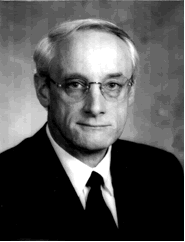While at NRC, he played a pivotal role in resolving almost every significant legal dispute arising in the nuclear regulatory field in the past two decades, and received three Presidential awards (one from President Reagan and two from President Bush) in recognition of his accomplishments.
At NRC, Mr. Malsch served as lead trial counsel in numerous contested nuclear plant construction permit and operating license hearings, including Shoreham, Diablo Canyon Unit 2, Point Beach Unit 2 and San Onofre Units 2 and 3. He was also lead counsel in proceedings involving the Clinch River Breeder Reactor and offshore nuclear power plants, as well as numerous rule-making proceedings. He played the principal role in resolving Atomic Energy Act and National Environmental Policy Act (NEPA) issues related to use of mixed oxide fuel in nuclear power reactors and in drafting amended NRC rules of practice (10 CFR Part 2), rules on nuclear waste management (10 CFR Parts 60 and 61), rules on nuclear non-proliferation (10 CFR Part 110), and changes in substantive and procedural rules for nuclear power reactor licensing (10 CFR Parts 50 and 100). He originated the concept that environmental effects of the uranium fuel cycle should be resolved generically by rule making, a concept ultimately sustained by the U.S. Supreme Court in Vermont Yankee Nuclear Power Corp. v. Natural Resources Defense Council, a landmark Administrative Law case. Mr. Malsch formulated both the legal and policy bases for NRC’s reactor backfit rule and originated the concepts of early site permits and reactor design certifications.
As Acting General Counsel and Deputy General Counsel, Mr. Malsch was responsible for drafting every significant Commission-level adjudicatory decision in the period 1980 to 1991. These included decisions authorizing the licensing of Diablo Canyon, Shoreham, and Seabrook, and the restart of Three Mile Island Unit 1. His decisions spanned the entire nuclear energy law field, including procedural rights of intervenors, relationship between rules and licensing, scope of antitrust review, emergency planning, reactor decommissioning, high-level waste disposal, financial qualifications, utility restructuring, and enforcement. Mr. Malsch worked in partnership with the NRC Solicitor in the successful defense of each Commission decision in the U.S. Courts of Appeals and argued cases in the U.S. Court of Appeals for the Third and D.C. Circuits. He assisted the NRC Solicitor and Solicitor and the U.S. Solicitor General in successfully defending the Government’s position before the U.S. Supreme Court in the watershed cases of Metropolitan Edison Co. v. People Against Nuclear Energy and Florida Power & Light Co. v. Lorion.
In the several years before joining the private sector, Mr. Malsch focused on key issues presenting unique legal and policy challenges. He drafted a Memorandum of Understanding between the NRC and the U.S. Environmental Protection Agency, played the lead role in eliminating duplicate NRC and EPA regulation of air emissions of radionuclides and played a leading role in drafting the NRC rules on nuclear power plant license renewal and decommissioning. He was responsible for nuclear power plant licensing reform rules (10 CFR Part 52), and served as lead NRC counsel for the first two nuclear power plant Design Certification proceedings involving GE and ABB-CE reactor designs.
Mr. Malsch served on NRC Senior Management Committees responsible for resolving issues associated with cleanup standards for radiologically contaminated sites, implementation of the plant license renewal rule, and use of probabilistic risk assessments in risk-informed regulation of nuclear reactors.
Mr. Malsch testified frequently before U.S. Congressional Committees and participated in drafting numerous legislative changes to nuclear energy statutes, including legislation extending NRC jurisdiction over mill tailings, amending and extending the Price-Anderson Act, and enacting nuclear power plant licensing reform. He also originated the legislative concept of certification for the two gaseous diffusion plants in Ohio and Kentucky.
Since joining the private sector, Mr. Malsch has continued to represent clients in the nuclear energy field. Among other things, he has advised companies engaged in commercial low-level radioactive waste disposal, advised a reactor vendor (under a DOE grant) on risk-informed NRC regulation, advised an international company on developing an international spent fuel storage facility, advised companies involved in complex radiological decommissioning projects, and advised clients involved in nuclear power plant mergers, acquisitions, and financing.
Mr. Malsch holds a B.S. degree in Physics from the College of the Holy Cross, studied nuclear physics at the graduate level at Florida State University, and received his law degree from the University of Connecticut School of Law. He has served as an Adjunct Professor of Law at the George Washington University Law School (teaching nuclear law), and is admitted to practice in Connecticut, Virginia and the District of Columbia. His most recent publication is "The Purchase of U.S. Nuclear Power Plants by Foreign Entities," Energy Law Journal, Vol. 20, No. 2, 1999.
